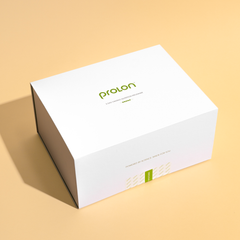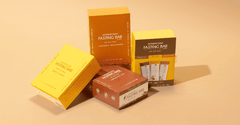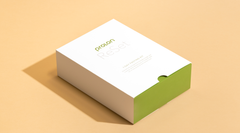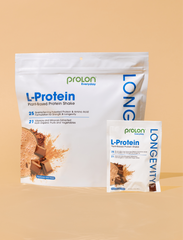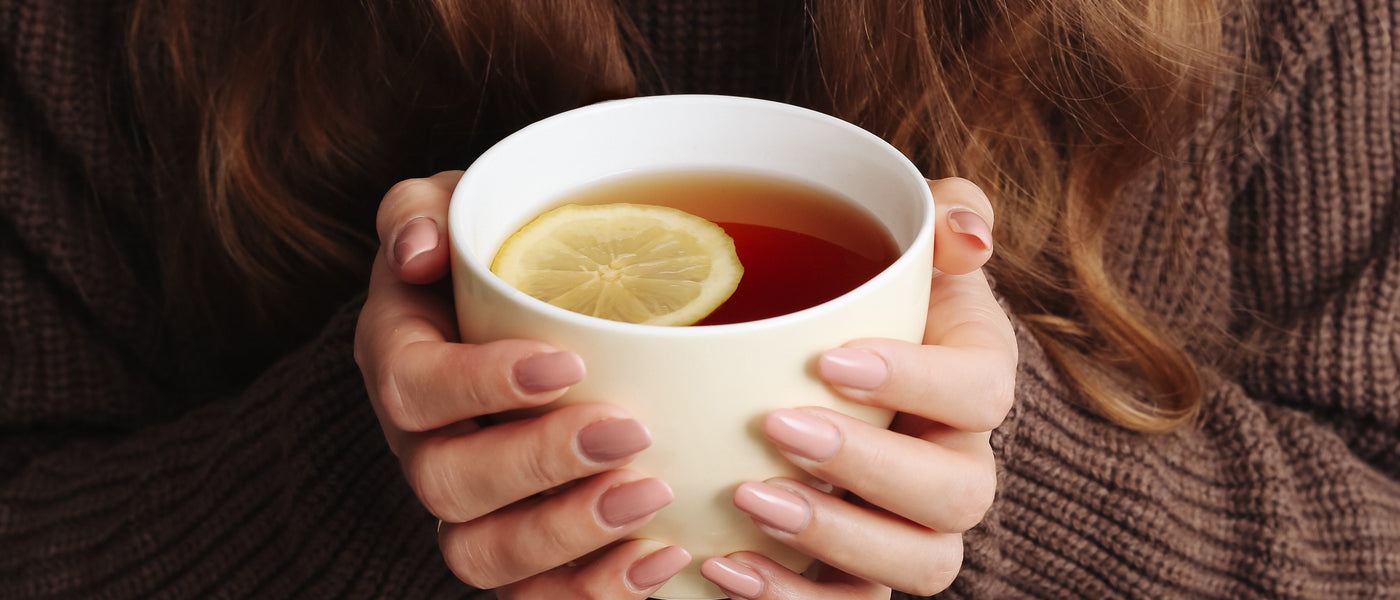
Does Drinking Tea Break Your Fast?
Key takeaways:
-
Drinking tea while fasting is generally allowed, and may even offer added benefits to support your experience.
-
Avoid any additions like milk, creamers, sugar, honey, or artificial sweeteners while fasting; these have calories, and can spike glucose levels.
-
Zero-calorie sweeteners are not advised while fasting, because they can affect the intestinal microbiome.
-
Caffeine should be limited, or at least avoided during a fast, especially for those with caffeine sensitivities
-
Teas are a valuable component of the Prolon Fasting Mimicking Diet (FMD), which includes several organic, herbal options to support your fast.
Fasting can be a powerful tool for supporting your weight and health goals—but only if you stick to the rules. While most fasting protocols make it obvious what not to eat, some drinks, like tea, often fall into a gray area. When it comes to the best practices of fasting, have you ever wondered: will drinking tea break my fast?
In this article, we’ll look at what types of tea you can drink during a fast, the science behind them, and why, when consumed correctly, they might help improve your overall fasting experience.
The general rule of tea and fasting: keep it plain and simple
You may be pleased to know that herbal, green, black, and even unsweetened matcha green teas may be included in most types of fasting regimens without breaking your fast. In fact, tea offers several health benefits that may also support your overall fasting experience—like hydration and their anti-inflammatory, antimicrobial, cholesterol-lowering, and neuroprotective properties. They’re also high in antioxidants which help protect your cells from free radicals that can cause damage and lead to chronic diseases over time.
If you’d like to take advantage of all the wonderful health perks tea has to offer while you fast, the key is to enjoy them without sweeteners, dairy, artificial flavorings, or other additions. Additives like these usually contain calories that may trigger an insulin response. Plain, unsweetened teas, on the other hand, are so low in calories they do not significantly activate the body’s nutrient sensing pathways, and are generally considered admissible for both intermittent and periodic fasting regimens, including Prolon’s Fasting Mimicking Diet (FMD).
Note: If you are considering a water fast, some experts say you can only consume plain water, and not tea. However, water fasting is a more extreme form of fasting, so as with all fasting regimens, you should consult a healthcare provider to discuss specifics, safety, and side effects before trying one.
Different types of tea you can drink while fasting
In addition to their plant leaves, most teas also contain polyphenols (plant-based antioxidants), minerals, certain amino acids like glutamine and L-theanine, as well as some vitamins. Depending on the kind of tea you drink, they may also contain caffeine, which should be limited to less than 140 mg a day during fasting, as it’s possible that higher levels can trigger your nutrient sensing pathways, and therefore kick the body out of its fasting state. If you’re sensitive to caffeine, tend to have trouble sleeping, or have atrial fibrillation or an arrhythmia, it’s recommended you avoid caffeinated teas entirely during your fast.
Here are some of the most common types of tea to incorporate into your fast, and the potential benefits they might provide:
-
Black tea may help support blood pressure and offer other cardiovascular protections; however, it naturally contains caffeine, so it’s important to be mindful of how much you consume a day. Some scientific studies suggest that black tea can help decrease blood glucose, improve insulin and lipoprotein profiles (lipid and cholesterol levels), and increase lipolysis, in which the body breaks down fat stores (triglycerides) to use as energy. Black teas also have antioxidants and flavonoids (anti-inflammatory, plant-derived phytochemicals) which have been linked to oxidative stress reduction.
-
Green tea may also help decrease fasting insulin levels and HbA1C (blood sugar) concentration. While still a caffeinated option, green tea has less caffeine than black tea and contains more catechins (plant-derived polyphenols and antioxidants) than any other dietary source, including chocolate, red wine, and apples. They also have more antioxidants than other types of tea, and have been shown to help potentially induce autophagy, the body’s natural process for clearing out old and damaged cells to prioritize healthier ones; the same process triggered around day three of the Fasting Mimicking Diet.
-
Matcha tea offers many of the same benefits as a green tea, since it’s produced from the same Camellia sinensis plant. In addition, it’s also been shown to help decrease stress and anxiety, and potentially improve short and long-term cognitive function. Since matcha is believed to positively affect the body’s gut-liver axis, drinking it regularly may help support metabolic health and weight management efforts.
-
Herbal teas can provide hydration, and stave off feelings of hunger during a fast, since these teas do not contain caffeine and can be enjoyed much more frequently. Again, just be sure there are no artificial flavors or sweeteners, and avoid any herbal teas that may contain bits of dried fruit– these things add calories, which can spike glucose levels and break your fast.
The following types of herbal tea have been used for centuries to ease pain, aid in digestion, and reduce some of the physical discomforts of fasting:
-
Ginger tea may alleviate gastrointestinal concerns like bloating, gas, and heartburn.
-
Hibiscus tea may help support electrolyte balance.
-
Peppermint tea is helpful for soothing symptoms associated with fasting like nausea and headaches.
-
Chamomile and jasmine tea may promote relaxation and sleep by inducing a sedative-like effect on the autonomic nervous system
The impact of additions: what breaks a fast
If you’re already a regular tea lover, you likely have your own preferences for how to enjoy it. Adding a bit of sugar or cream to your black tea or a drizzle of honey into your herbal cup may be good for non-fasting days, but during a fast, these things must be omitted if you don’t want to compromise the fasting state. Here’s why the following tea additives will definitely break a fast:
-
Adding milk to tea during fasting not only introduces extra calories, but carbohydrates and fats too. Even a small amount of cream or other dairy products, as well as non-dairy alternatives like almond, soy, or coconut milks, will take your body out of its fasting state.
-
Adding sugar to tea during fasting will very likely spike your glucose levels, especially since your body is getting fewer or no other nutrients during a fast. Other natural sweeteners like honey and agave must also be omitted for the same reason.
-
Adding zero-calorie artificial sweeteners during fasting may seem like a safe bet because they don’t include any calories. Nevertheless, studies have shown that zero-calorie sweeteners may still trigger an insulin response, and alter the intestinal microbiota which can lead to glucose intolerance. Since one key goal of fasting is promoting better health for your gut microbiome, these sweeteners can be therefore counterproductive to the fasting cause. It’s advisable to consult your healthcare provider before including these in any fasting protocol.
Does caffeine break a fast?
On its own, caffeine does not have any calories, and is generally considered ok in smaller amounts during a fast. There is limited evidence, however, that caffeine could have the potential to activate the PKA pathway, an enzyme that regulates cell growth and metabolism. As a result, it’s recommended to limit caffeine intake to less than 140 mg a day as a precaution (or one 8oz cup of coffee).
For those who choose to include some caffeine while fasting, a cup of black or green tea can help boost energy and sharpen focus, especially if fatigue sets in. Caffeine has also been shown to have appetite-suppressing properties that may help curb any hunger pangs you might feel during a fast. These benefits will not be the same for everyone, however, and it’s important to note that every individual’s response to caffeine may be different. Similarly, if you’re sensitive to caffeine, it can cause you to feel jittery or even anxious, especially on an empty stomach; in this case, it’s always best to listen to your own body, limit your caffeine intake, or omit it entirely while you fast.
Potential benefits of drinking tea while fasting
Beyond the specific benefits of the teas we’ve mentioned so far, there may be some more general upsides to drinking tea during a fast. For example, tea contains certain concentrated minerals like fluoride, manganese, calcium, magnesium, and zinc, to name a few, which have been shown to positively impact things like bone density, immunity, energy production, mood, and stress management. Drinking tea, specifically non-caffeinated options, is another way to stay hydrated too. Nearly 30% of our body’s water consumption comes from the food we eat, so it’s particularly vital to drink more water during fasting to avoid dehydration and electrolyte imbalances. Finally, in addition to the potential antioxidant benefits tea provides, the simple sense of comfort and normalcy that sipping a cup throughout your fasting day offers may help soothe any feelings of discomfort or mental anxiety you may experience while fasting.
Drinking tea during the Prolon Fasting Mimicking Diet
One fasting routine that uses teas to support the experience is Prolon’s 5-Day FMD. Its specially-formulated nutrition technology is backed by over 25 years of clinical research, and designed to support the body’s natural processes of cleansing at the cellular level. The FMD differs from more conventional fasting types because it offers a very specific combination of key nutrients that keep the body in a fasting state while allowing it enough nourishment to perform necessary processes and protect lean muscle mass.
Each 5-Day FMD kit includes several sachets of lemon, spearmint, and hibiscus teas that are specifically curated to support the fasting experience. Each one is organic, herbal, and non-caffeinated, so you’re encouraged to drink as many cups throughout the day as you like. It’s one of the elements that helps make the program a positive experience, as well as an effective tool for health and longevity. If you’re looking for an option that delivers the key benefits of fasting—including fat-focused weight loss with lean muscle protection, lowered BMI, improved skin appearance, and autophagy-induced cellular cleanup—the FMD may be an ideal solution for you.

Practical guidelines for tea lovers who fast
If you’re considering a fasting protocol, and would like to include teas for their added benefits and comfort, here are some basic tips to remember:
-
Stick to plain, unsweetened tea, and avoid any additions like milk, sugar, and natural or artificial sweeteners.
-
Listen to your body and observe how different teas affect your hunger levels and overall fasting experience, especially when it comes to caffeinated teas. Limit caffeine intake to less than 140 mg per day, or omit it entirely for those with caffeine sensitivities or a history of cardiovascular concerns.
-
Consult with a healthcare professional for more personalized guidance, especially if you’re thinking about undertaking a longer fasting variant, or if you have existing health conditions.
For more information about Prolon, or the 5-Day FMD, reach out to our team anytime. We’re always here to help support and empower your health and longevity goals!
Sources:
European Journal Of Applied Physiology. “Sedative effects of the jasmine tea odor and (R-(-)-linalool, one of its major odor components, on autonomic nerve activity and mood states.” Website.
National Library Of Medicine. National Center For Biotechnology Information. “A Review of the Role of Green Tea (Camellia sinensis) in Antiphotoaging, Stress Resistance, Neuroprotection, and Autophagy.” Website.
National Library Of Medicine. National Center For Biotechnology Information. “Black tea lowers blood pressure and wave reflections in fasted and postprandial conditions in hypertensive patients: a randomised study.” Website.
National Library Of Medicine. National Center For Biotechnology Information. “Caffeine, coffee, and appetite control: a review.” Website.
National Library Of Medicine. National Center For Biotechnology Information. “Effect of green tea on glucose control and insulin sensitivity: a meta-analysis of 17 randomized controlled trials.” Website.
National Library Of Medicine. National Center For Biotechnology Information. “Matcha green tea targets the gut–liver axis to alleviate obesity and metabolic disorders induced by a high-fat diet.” Website.
National Library Of Medicine. National Center For Biotechnology Information. “Molecular evidences of health benefits of drinking black tea.” Website.
National Library Of Medicine. National Center For Biotechnology Information. “Role of Herbal Teas in Regulating Cellular Homeostasis and Autophagy and Their Implications in Regulating Overall Health.” Website.
National Library Of Medicine. National Center For Biotechnology Information. “The therapeutic potential of matcha tea: A critical review on human and animal studies.” Website.
Nature. “Artificial sweeteners induce glucose intolerance by altering the gut microbiota.” Website.
Science Direct. “Effects of Tea Consumption on Nutrition and Health.” Website.











